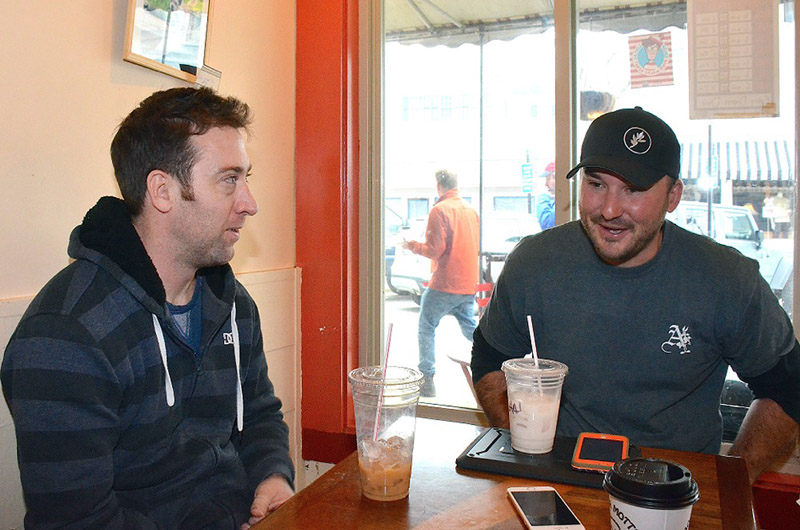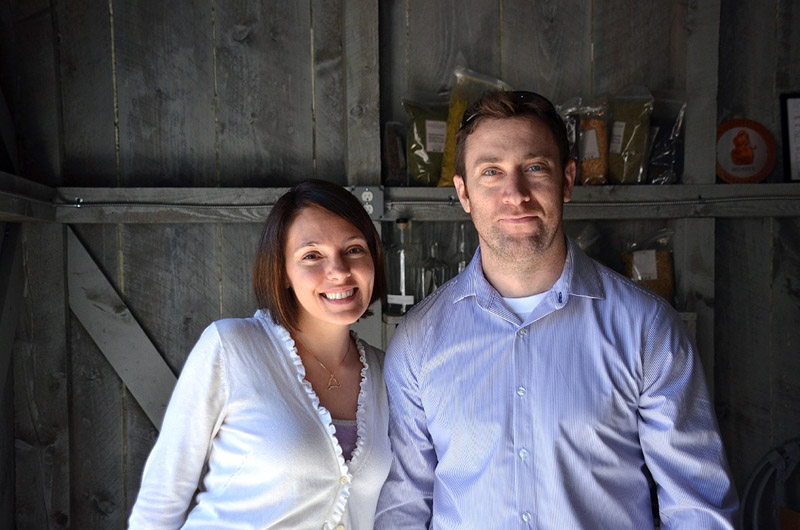Guarded by a sentry of geese and turkeys and hidden away at a farm, something is brewing in Vineyard Haven. Well, not brewing — distilling.

In a converted barn with a view of tree-topped hills, Ryan Shea and Nick Peters are making vodka, gin, and rum with their new business, Martha's Vineyard Distilling Co.
Though both grew up on the Island and even sat next to each other for three years in high school, Mr. Shea and Mr. Peters never thought they’d be working together. By day, Mr. Shea is an optometrist and Mr. Peters a contractor and general jack-of-all-trades. They bonded over an interest in spirits and creating an Island distillery while Mr. Peters was doing some construction at Mr. Shea’s house. Sealing the deal with a handshake on the porch, they started MV Distilling. That was two years ago.
Operating a distillery requires permits and licenses from the state and federal level. The entire operation needs to be ready to go before the permits will be granted; would-be distillers cannot experiment with one drop of liquor before they receive the paperwork.
For awhile, Mr. Peters and Mr. Shea sat with a fully functional distillery waiting for the final word from the powers that be. A little over three weeks ago, they were handed permission and experimentation could begin. MV Distilling’s hard-won permits hang proudly on the wall of their barn-distillery, next to a certificate from the Artisan Craft-Distilling Institute in Washington state, where Mr. Shea took a 10-day course, and a certificate of membership from the American Distilling Institute.
“You can be a farm distillery or a micro distillery” said Mr. Shea, “And we qualify as both.” Right on cue, a turkey outside let out a throaty warble.
The operation is small, with shining steel and copper instruments stretching toward the unfinished wood roof where pallets of grain are stored.
“We might be the smallest distillery in the world,” Mr. Shea said.
Spirits are hand bottled and labeled by Rachel Cottle-Shea, Mr. Shea’s wife, though a bet has been placed on how many cases she will hand label before giving in and purchasing a labeller. It took MV Distilling a round of trial and error to pick out a bottle design that they liked and that looked good with their label, and Mr. Shea confessed to having about 30 empty, unused bottles of different designs sitting around at home.
On a recent day at the distillery, they were working on a batch of wheat vodka.
“It all comes down to grain and water,” he said. “Corn, wheat and rye. We tried corn, we’re trying wheat, and we’re going to try rye.”
Vodka is the simplest to make; it is pure alcohol vapor. Gin is where they use their creativity. On the “science wall” in their barn-distillery a shelf is chock full of herbs. Mrs. Cottle-Shea said Mr. Peters and Mr. Shea guard their herbs jealously, not letting her sneak even a few bay leaves home from the one-pound sack.
Mr. Peters has a very specific, highly secret combination of herbs in mind for a gin. He won’t even share it with his partner. Because they could only begin distilling about a month ago, MV Distilling does not have any firm recipes yet. Mr. Peters and Mr. Shea are looking to the Island for inspiration. Local honey, herbs and flowers will all be used, and they hope that one day they can use local grain.
“We just liked the idea of a farm,” Mr. Shea said.
“Everything comes from a farm,” Mr. Peters continued. And everything is returned to a farm. Waste created by the distilling process will be fed to their neighbors, a brood of speckled pigs.
MV Distilling will kick off this summer selling vodka, gin and rum in restaurants. Whiskey will be aging in barrels to be debuted next year.
Mr. Peters and Mr. Shea see endless possibilities for their spirits: collaborating with breweries, creating custom cocktails, a tasting room. But for right now, they are focused on the first steps: nailing down the recipes, picking out the right bottle, and finding shelf space behind the bar at Vineyard restaurants.







Comments (9)
Comments
Comment policy »